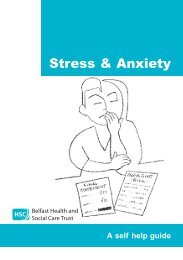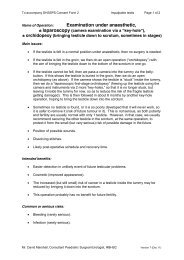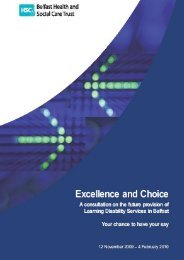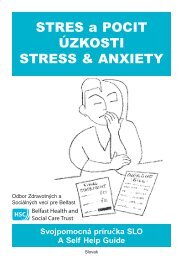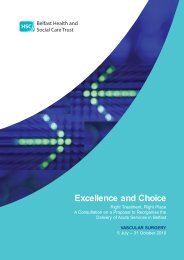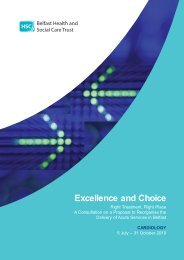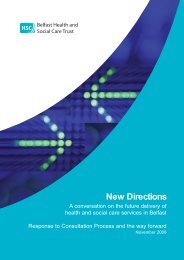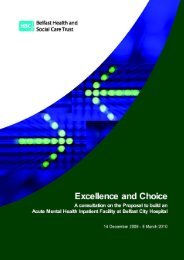New Directions (2008) - Belfast Health and Social Care Trust
New Directions (2008) - Belfast Health and Social Care Trust
New Directions (2008) - Belfast Health and Social Care Trust
- No tags were found...
Create successful ePaper yourself
Turn your PDF publications into a flip-book with our unique Google optimized e-Paper software.
<strong>New</strong> <strong>Directions</strong>A conversation on the future delivery ofhealth <strong>and</strong> social care services in <strong>Belfast</strong>
CONTENTS:PageForeword 3Guiding Principles 4Proposals for the modernisation <strong>and</strong> reform of services 5How do I get access to community health <strong>and</strong> social care services? 6Where do I go if I am having a baby? 7Where do I go if I need to access services for children? 9Where do I go if I need support or care because of my physical orsensory disability?Where do I go if I need support because I have a learningdisability?Where do I go if I am an adult <strong>and</strong> need mental health services or Ihave an acute mental illness?111214Where do I go if I need acute hospital services? 14Where do I go if I need support because I am an older person? 16Next Steps 172
Foreword<strong>Belfast</strong> <strong>Health</strong> <strong>and</strong> <strong>Social</strong> <strong>Care</strong> <strong>Trust</strong> was formed in April 2007 from the merging of six<strong>Trust</strong>s, four of which were acute – the Royal Hospitals, <strong>Belfast</strong> City Hospital, the MaterHospital <strong>and</strong> Green Park - <strong>and</strong> two Community <strong>Health</strong> <strong>and</strong> <strong>Social</strong> Services <strong>Trust</strong>s,serving north <strong>and</strong> west <strong>Belfast</strong> <strong>and</strong> south <strong>and</strong> east <strong>Belfast</strong>.The new <strong>Belfast</strong> <strong>Trust</strong> aims to build on the fine legacy established by the six <strong>Trust</strong>s todeliver integrated <strong>and</strong> seamless citizen-centred health <strong>and</strong> social care.The <strong>Trust</strong> has set out in a document entitled “The <strong>Belfast</strong> Way” - its values <strong>and</strong>objectives for the future delivery of its service to achieve excellence for the citizens of<strong>Belfast</strong>.The challenge for <strong>Belfast</strong> <strong>Trust</strong> is to create an overarching <strong>and</strong> unified health <strong>and</strong> socialcare system for the population we serve. We believe the delivery of services should besimplified. Unnecessary duplication <strong>and</strong> fragmentation of services should be reduced<strong>and</strong> services should be more clearly signposted for our patients, clients <strong>and</strong> their carers.The integration of hospital <strong>and</strong> community services under new management structureswas the first step towards delivering services that are centred round people <strong>and</strong> notinstitutions.<strong>Belfast</strong> <strong>Trust</strong> believes it is timely to modernise the way we deliver our health <strong>and</strong> socialcare. We want to reform <strong>and</strong> renew our services so we can deliver care in a faster, moreflexible, less bureaucratic <strong>and</strong> more effective way to our citizens. The <strong>Trust</strong> aims to havethe right care, delivered by the right person in the right place. The <strong>Trust</strong> is alsoundertaking an organisational reform programme which focuses on how best we use ourresources, performance improvement <strong>and</strong> effective service delivery. The programme iscalled MORE – Maximising Outcomes Resources <strong>and</strong> Efficiencies. It will complementthis modernisation process to examine how <strong>Belfast</strong> <strong>Trust</strong> will deliver its services in thefuture, as well as addressing the challenging efficiency agenda.It is against this background that the <strong>Belfast</strong> <strong>Trust</strong> has started a process to examine howit will deliver its services in the future.The ideas in this paper represent an initial direction of travel for the way services will beprovided in the future. These ideas were subject to a period of consultation in late <strong>2008</strong>.A wide range of responses to the consultation document were received <strong>and</strong> theyprovided a richness of views on the way services of the <strong>Belfast</strong> <strong>Trust</strong> should be providedinto the future.Each key proposal for a service change will be consulted upon further - to whateverextent is necessary, in keeping with the <strong>Trust</strong>’s commitment to consult with staff, serviceusers, carers, trades unions <strong>and</strong> the public at large.3
Guiding PrinciplesThe approach to reviewing <strong>and</strong> reorganising the services of the <strong>Trust</strong> must be guided bysome general principles. These principles are as follows:Improve health <strong>and</strong> wellbeing <strong>and</strong> reduce health inequalities – This is the corepurpose of the <strong>Trust</strong>.Focus on prevention of illness, early assessment <strong>and</strong> intervention. This is a keyobjective of the <strong>Trust</strong>.Focus on individual needs <strong>and</strong> choices – This concept is embedded in all serviceaspirations. Our <strong>Trust</strong> will deliver citizen – centred <strong>and</strong> holistic (incorporatingpsychosocial care) health <strong>and</strong> social care.Provide safe, high quality, effective care – This is a core objective of the <strong>Belfast</strong> <strong>Trust</strong>.Improve accessibility to services – promote equity <strong>and</strong> welcome diversity – Ouraim is to improve the universal accessibility of services through ensuring that servicesare delivered equitably to all sections, including cultural minorities. The <strong>Trust</strong> will simplify<strong>and</strong> improve arrangements for accessing its services.Localise where possible, centralise where necessary – Services are more easilyaccessed by people when they are delivered locally, while specialist services benefitfrom the concentration of expertise <strong>and</strong> experience required to deliver the highestpossible levels of clinical care. The <strong>Trust</strong> therefore aims to provide its services locallywhere the st<strong>and</strong>ard of service can be assured <strong>and</strong> centralise its services where it willraise the quality of provision.Integrate services (through partnerships working) – We aim to meet the challenge ofdelivering maximum benefit from the integration of acute, community <strong>and</strong> social careservices for our population. Working in partnership with individuals, communityorganisations, voluntary <strong>and</strong> statutory agencies results in more appropriate care <strong>and</strong>treatment, improved outcomes, better experience for our service users, improved health<strong>and</strong> wellbeing for communities <strong>and</strong> greater social inclusion.Recognition of the role of carers <strong>and</strong> families – The <strong>Trust</strong> recognises <strong>and</strong> values thekey role of carers <strong>and</strong> families <strong>and</strong> the contribution they make to the provision ofservices.Provide clear directions to services, reducing fragmented <strong>and</strong> frustrating services– Service flow, in a complex health care system, is recognised as a pivotal challenge toservice delivery. Our <strong>Trust</strong> will reform <strong>and</strong> renew its services to deliver care in a faster,more flexible, less bureaucratic <strong>and</strong> more effective way to its citizens.Maximise utilisation of assets – There is a clear need to make best use of all existing health<strong>and</strong> social care infrastructure across the <strong>Trust</strong> <strong>and</strong> keep the need for new buildings to aminimum while also addressing risk issues, such as those attached to ageing buildings.4
Proposals for the modernisation <strong>and</strong> reform of servicesThe <strong>Trust</strong> has started the process of reviewing how services could be delivered in thefuture. We have outlined proposed models of care which are based on discussionswithin the <strong>Trust</strong>. The models are set in the context of policy decisions outlined by theDepartment of <strong>Health</strong> <strong>and</strong> <strong>Social</strong> Services <strong>and</strong> developed in the Assembly’s Programmefor Government. We have consulted on the direction of travel for future service provisionwith the users of our services, carers, the public <strong>and</strong> the key stakeholders, includingGeneral Practitioners.In writing this document the <strong>Trust</strong> thought it would be useful to guide you through thecomplex range of <strong>Trust</strong> services by asking questions that follow the stages of life whenyou may need to access <strong>Health</strong> <strong>and</strong> <strong>Social</strong> <strong>Care</strong> Services from the <strong>Belfast</strong> <strong>Trust</strong>. Forexample the <strong>Trust</strong> has posed the question “Where do I go if I need support because I aman older person?” We have described the principle guiding how we provide services <strong>and</strong>described the model of care favoured by the <strong>Trust</strong>.5
How do I get access to Community <strong>Health</strong> <strong>and</strong> <strong>Social</strong> <strong>Care</strong> Services <strong>and</strong> beinformed about services that are available to me?The <strong>Trust</strong>’s strategy is to localise services where possible <strong>and</strong> centralise wherenecessary.We have established a network of seven Wellbeing <strong>and</strong> Treatment Centres, strategicallylocated within the main community sectors across <strong>Belfast</strong>. These are intended to besingle access points for information, advice <strong>and</strong> services. They are intended toincreasingly offer out of hospital services, complementing the work of general practice<strong>and</strong> acute care.The Grove Centre in north <strong>Belfast</strong>, has recently opened. The Knockbreda Centreopened in January 2009. Carlisle Centre in north <strong>Belfast</strong>, Bradbury Centre in south<strong>Belfast</strong> <strong>and</strong> the Arches Centre in east <strong>Belfast</strong> have been open for some time now. TheShankill Centre <strong>and</strong> West <strong>Belfast</strong> Centre are set to open in 2010.The <strong>Trust</strong> is currently undertaking a review of the services offered at Wellbeing <strong>and</strong>Treatment Centres to establish if additional hospital based services in particularoutpatient clinics, could be located within the Centres.Community services will be provided in the seven major Wellbeing <strong>and</strong> TreatmentCentres. These are “one-stop shops”, which are easy to access as they are based onmain roads in the heart of the community. Services that will be available in theseCentres vary slightly between each Centre but all have dentistry, occupational therapy,physiotherapy, speech <strong>and</strong> language therapy. <strong>Social</strong> workers for children, older people<strong>and</strong> people with physical or learning disabilities are based in these centres as well ashealth visitors <strong>and</strong> midwives. These staff often work in multi-disciplinary teams.6
Where do I go if I am having a baby?The <strong>Belfast</strong> <strong>Trust</strong>’s underpinning principle is that pregnancy <strong>and</strong> childbirth are normal lifeevents. Our priority is to provide safe, high quality care for all parents <strong>and</strong> their babies inthe local community <strong>and</strong> across the Region.PrinciplesCentral to the delivery of the <strong>Belfast</strong> <strong>Trust</strong>’s Maternity Services are Choice, Continuity<strong>and</strong> Control:Women have the right to choose how <strong>and</strong> where to give birth. This choice shouldbe supported by high quality information <strong>and</strong> evidence based clinical advice thatensures maximum participation in decision making.One to one midwifery care should be given to women during labour <strong>and</strong> childbirthin order to make sure that they have individualised attention <strong>and</strong> support, withcontinuity of carer.Maternity services should be locally accessible <strong>and</strong> comprehensive with clearevidence of joint working across multidisciplinary teams <strong>and</strong> sectors.There should be specific services for women with poor obstetric or medical historyor complications in early pregnancy.A comprehensive antenatal diagnostic <strong>and</strong> screening service should be available<strong>and</strong> offered to women in order to detect, where possible, any maternal problemsor fetal abnormalities at an early stage.Holistic care should be provided. The women <strong>and</strong> her family’s circumstancesshould be assessed holistically, while also recognising where appropriate the roleof carers <strong>and</strong> families in providing support. Psychological <strong>and</strong> social need shouldbe identified early <strong>and</strong> managed appropriately.Postnatal care should be provided to facilitate the transition to motherhood bymaking sure ill health is prevented or detected <strong>and</strong> managed appropriatelyincluding a multi professional, multi agency service for women who have, or are atrisk of, postnatal depression <strong>and</strong> other mental illness.The <strong>Belfast</strong> <strong>Trust</strong>’s model of care favours a holistic, community based model ofmaternity care which incorporates a wide range of services in a variety of settingsincluding the women’s own home, Wellbeing <strong>and</strong> Treatment Centres, a midwife led unit<strong>and</strong> a single inpatient obstetrics unit.7
At present, inpatient obstetric services are provided at the Mater Hospital <strong>and</strong> the RoyalJubilee Maternity Service on the Royal Hospitals site. The <strong>Belfast</strong> <strong>Trust</strong> favours theprovision of inpatient obstetric services including neonatal services on a single site (onthe Royal Hospitals site), complemented by the provision of a midwifery led unit (at theMater Hospital). Post natal care will be provided in the home following early dischargefocussing on the promotion of normality. Community midwifery teams will provideongoing assessment, monitoring <strong>and</strong> support of mothers <strong>and</strong> infants.The <strong>Trust</strong> will continue to work with stakeholders to explore the options for deliveringobstetric services to ascertain the most appropriate solution for the future.8
Where do I go if I need to access services for children?The <strong>Belfast</strong> <strong>Trust</strong> has responsibility to provide a range of both health <strong>and</strong> social servicesnot only to its local resident childhood population but it has also been commissioned toprovide many regional <strong>and</strong> sub regional services such as, specialist acute services, Child<strong>and</strong> Adolescent Mental <strong>Health</strong> Services <strong>and</strong> Adoption Services.While the <strong>Trust</strong> is responsible for services to children presenting with health relatedconditions or social life experiences which require assessment <strong>and</strong> intervention, we alsoprovide universal services to all <strong>Belfast</strong> children such as immunising programmes, childhealth surveillance, dental services <strong>and</strong> school nursing.<strong>Belfast</strong> <strong>Trust</strong> has also a particular responsibility to provide services to vulnerablechildren. This group includes children with disabilities, children at risk of harm, childrenin need, looked after children <strong>and</strong> children from minority communities. The <strong>Trust</strong>however holds the view that services to vulnerable children should be provided within thecontext of services for all children to avoid the stigma of labelling <strong>and</strong> exclusions.PrinciplesCentral to the delivery of the <strong>Belfast</strong> <strong>Trust</strong>’s children’s services are the followingprinciples:Paramouncy of a child’s best interests, should be determined in consultation withparents <strong>and</strong> carers, the child <strong>and</strong> appropriately trained <strong>and</strong> experiencedprofessionals. Child welfare, safeguarding <strong>and</strong> child protection are primaryconsiderations in the provision of all children’s services.Participation of children <strong>and</strong> their families <strong>and</strong> carers in the design, delivery <strong>and</strong>evaluation of services. The voice of the child needs to be heard.Partnerships between the <strong>Belfast</strong> <strong>Trust</strong> <strong>and</strong> the local community, the voluntarysector, other statutory bodies such as the <strong>Belfast</strong> City Council, <strong>Belfast</strong> EducationBoard <strong>and</strong> the Police Services of Northern Irel<strong>and</strong>. In many instances thesepartnerships involve sharing resources such as staff <strong>and</strong> buildings.Promotion of positive child health is key to the <strong>Belfast</strong> approach which we believewill impact on childhood illness, child abuse <strong>and</strong> neglect <strong>and</strong> infant mortality. Thisinvolves assisting parents at an early stage to give their children a good start <strong>and</strong>support into adulthood. It involves an emphasis on prevention <strong>and</strong> family supportas well as assisting young people to make healthy lifestyle choices.A child focussed service, with experienced, safe <strong>and</strong> skilled children practitioners.9
Where do I go if I need support or care because of my physical or sensory disability?The <strong>Trust</strong>’s principles for the care of people with physical or sensory disabilities are to:Respect the individuality of service users <strong>and</strong> carersEnsure that services are person centred <strong>and</strong> offer maximum choice of serviceEnable disabled people to have the fullest possible control over their lives <strong>and</strong> tomaximise their independence <strong>and</strong> inclusion in their chosen communitiesPromote a community development approach to services to maintain people intheir own environment <strong>and</strong> to promote partnership working across organisations<strong>and</strong> groupsProvide accessible information, services <strong>and</strong> facilitiesInvolve service users <strong>and</strong> their carers fully in service development <strong>and</strong> evaluationCo-ordinate services to maximise continuity <strong>and</strong> a holistic approachEnsure that services are provided within agreed timeframesPromote efficient <strong>and</strong> effective high quality services that offer positive outcomes<strong>and</strong> value for money.The <strong>Trust</strong> favours a model of care that continues to provide a range of specialistrehabilitation services on a single site, Musgrave Park Hospital. This will includeacquired brain injury rehabilitation, spinal cord injury rehabilitation, amputee rehabilitation<strong>and</strong> post fracture rehabilitation for older persons.Patients requiring non urgent but essential admission for expert multi-disciplinaryassessment of neurological disorders, deterioration in neurological status <strong>and</strong>subsequent decline in functional ability will be co located with the specialist rehabilitationservices at Musgrave Park Hospital.The <strong>Trust</strong>’s services plan is that people with physical or sensory disability should besupported to live as independently as possible in the community. Following medicaldiagnosis <strong>and</strong> treatment the <strong>Trust</strong>’s physical <strong>and</strong> sensory disability teams will offeradvice on the range of services available. These teams will continue to work inpartnership with other statutory bodies (eg the Housing Executive) <strong>and</strong> the voluntarysector (eg Royal National Institute for the Blind) to maximise independence. Physical<strong>and</strong> Sensory Disability teams will be based in Wellbeing <strong>and</strong> Treatment Centres.11
Where do I go if I need support because I have a learning disability?The <strong>Trust</strong>’s principles for services for people with learning disabilities are:Service users should be in control of their lives. The <strong>Trust</strong> recognizes that someservice users may need support to make decisions. This support can be soughtfrom a wide range of sources, families, carers <strong>and</strong> professionalsService users should have their rights respectedClients with a learning disability should have equity of access to all servicesprovided by the <strong>Trust</strong>The availability <strong>and</strong> range of appropriate therapies <strong>and</strong> treatments shouldincrease in community settings.The <strong>Trust</strong> favours a model of care that supports people with a learning disability to enjoy<strong>and</strong> live full lives in their local communities through provision of a range of family, carer,voluntary <strong>and</strong> statutory support services.Muckamore Abbey Hospital will continue to provide inpatient assessment <strong>and</strong> treatmentservices but after 2016 it should not be a home for life for people with a learningdisability. Providing there is betterment in their care, people should experiencecommunity living.The <strong>Trust</strong> plans to develop, in partnership with other agencies, homes for life in thecommunity that will provide high quality accommodation <strong>and</strong> support for people withlearning disabilities including those with complex <strong>and</strong> challenging needs.Also, in partnership with others, the <strong>Trust</strong> plans to exp<strong>and</strong> the availability of small respiteunits <strong>and</strong> develop a small number of community treatment beds for people in <strong>Belfast</strong>.We will also work with other partners to increase employment <strong>and</strong> access to local leisureactivities for people with learning disabilities.Additionally the <strong>Trust</strong> plans to develop new day service accommodation across the cityfor people with complex needs <strong>and</strong> challenging behaviour who require high levels ofsupport.12
Where do I go if I am an adult <strong>and</strong> need mental health services or I have an acutemental illness?The <strong>Trust</strong>’s strategy is to provide a modern, responsive mental health service in a rangeof settings. The aim is to move away from hospital-based models of services to earlyintervention <strong>and</strong> community support. Hospital services should be focussed on acuteepisodes requiring short stay assessment <strong>and</strong> treatment services. The resettlement oflong-stay mental health clients into the community should be speeded up.The principles guiding the strategic service plan for mental health services are:Service users should be supported to keep in control of their lives – this support can beprovided by a wide range of services, families, carers <strong>and</strong> professionals.Service users should have their rights respectedService users with a mental illness should have equity of access to all servicesprovided by the <strong>Trust</strong>Services will be clearly signposted to ensure that service users are directed to themost appropriate service <strong>and</strong> are aware of all services provided. Clear pathwaysof care must be developed, with a particular emphasis on the need for earlyintervention servicesPsychological therapies <strong>and</strong> treatments should be more available in both hospital<strong>and</strong> community settingsServices should be developed for those at greatest risk in the community, forexample, Travellers <strong>and</strong> members of minority groups.The <strong>Trust</strong> favours a model of care that provides more community based services suchas day treatment services <strong>and</strong> crisis beds in the community. Services will be providedlocally within the community. Admissions to acute inpatient mental health beds will bereduced because of early intervention <strong>and</strong> continuity of treatment <strong>and</strong> care in thecommunity.At present, acute inpatient mental health services are provided at <strong>Belfast</strong> City Hospital,the Mater Hospital <strong>and</strong> Knockbracken <strong>Health</strong>care Park. The <strong>Trust</strong> favours thedevelopment of a single acute inpatient mental health facility to accommodate patientswhose acute mental health crisis cannot be managed <strong>and</strong> treated within the homesetting. The emphasis is to provide short term assessment <strong>and</strong> treatment.The single acute inpatient mental health facility will be part of a network of residential,day care <strong>and</strong> treatment centres provided locally throughout <strong>Belfast</strong>.13
Where do I go if I need acute hospital services (that is emergency services,planned care <strong>and</strong> long term chronic condition management)?The key service delivery principles developed by the <strong>Trust</strong> are as follows:To localise services where possible <strong>and</strong> centralise services only where necessaryTo centralise <strong>and</strong> develop networks for major trauma, heart conditions <strong>and</strong> strokeTo develop clear pathways to access appropriate emergency care (includingurgent care for chronic admissions) <strong>and</strong> primary care in GP out-of-hours servicesTo provide a single point of contact for emergency chronic condition admissionsTo re-profile services to make best use of each emergency department <strong>and</strong> toimprove patient flows, to provide a range of services to patients to access <strong>and</strong>meet targetsTo develop protected elective services <strong>and</strong> thereby improve patient flows <strong>and</strong>effectively <strong>and</strong> efficiently meet access targetsTo reduce unnecessary duplication <strong>and</strong> fragmentation of services.Based on these principles the <strong>Trust</strong> proposes that:Emergency Services would be retained at the Mater Hospital, <strong>Belfast</strong> City Hospital <strong>and</strong>Royal Hospitals. However, there would be differentiation of services to improve patientcare, based on the type of patient’s condition <strong>and</strong> needs.Cardiology services would be provided at the Mater Hospital, <strong>Belfast</strong> City Hospital <strong>and</strong>Royal Hospitals. Services should be localised where possible <strong>and</strong> centralised wherenecessary, <strong>and</strong> delivered in the location most appropriate to the patient pathway <strong>and</strong>condition.The provision of a major acute hospital; encompassing trauma services, emergencyservices <strong>and</strong> a heart centre on the Royal Hospitals site.The provision of a range of acute hospital services <strong>and</strong> a Regional Ophthalmic Centre(including a unit for planned eye surgery <strong>and</strong> treatment) on the Mater Hospital site, aspart of a larger ambulatory care centre.The provision of a range of acute hospital services, encompassing cancer <strong>and</strong> renalservices, the chronic admissions centre as well as the major elective centre for <strong>Belfast</strong>(including an elective orthopaedics unit) on the <strong>Belfast</strong> City Hospital site.The provision of specialist rehabilitation services on Musgrave Park Hospital site.14
The <strong>Trust</strong> is committed to further consultation around the configuration of acute hospitalservices, as more detailed review work is undertaken. As part of the review process dueconsideration will be given to distinguishing between local <strong>and</strong> regional services.15
Where do I go if I need support because I am an older person?The <strong>Trust</strong>’s Strategy for Older Peoples Services aligns with the Eastern <strong>Health</strong> <strong>and</strong><strong>Social</strong> Services Board’s Strategy <strong>and</strong> the following service principles have beenidentified:Services should be accessible <strong>and</strong> usable by all older citizensThe promotion of health <strong>and</strong> wellbeingMaximising independenceThe promotion of appropriate long term living optionsBetter dementia services <strong>and</strong> improved mental health among older people.The <strong>Trust</strong> will achieve this through:The promotion of improved health <strong>and</strong> wellbeing through supporting older people tolive independentlyMaximising the independence of older people through access to specialistrehabilitation <strong>and</strong> integrated care teamsTargeting <strong>and</strong> improving support for carersEnhancing the quality <strong>and</strong> care offered by nursing <strong>and</strong> residential homesThe development of new models of care for older people with dementia <strong>and</strong> mentalhealth problems including crisis intervention <strong>and</strong> increased community basedapproaches.The model of care favoured by the <strong>Trust</strong> is that older people should be maintained intheir own homes, supported by a network of care services that enable them to maintaintheir quality of life.The <strong>Trust</strong> believes that acute hospital care should only be accessed in the acute phaseof an illness <strong>and</strong> appropriate service provision, for example, intermediate care, stepdown<strong>and</strong> rehabilitation services should be utilised as appropriate through the variousstages of the patient journey. No one will be denied access to acute care when theirillness requires this care.By developing a fuller range of long term living options, in partnership with housingproviders <strong>and</strong> the independent sector, we will be able to re-provide our own residentialservices in more appropriate settings.16
NEXT STEPS<strong>New</strong> <strong>Directions</strong> is the beginning of a conversation between <strong>Belfast</strong> <strong>Trust</strong> <strong>and</strong> the citizenswe serve on how we should deliver services in a faster more flexible, less bureaucratic<strong>and</strong> more effective way.The <strong>Trust</strong> will continue to engage with stakeholders as proposals for specific servicechanges emerge.The <strong>New</strong> <strong>Directions</strong> document will be reviewed <strong>and</strong> updated bi-annually.17



